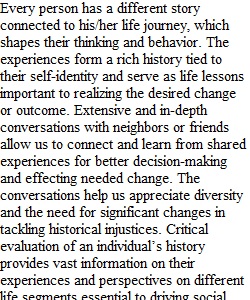


Q Oral History Project Summary: You have spent this semester learning history and what it means to be a historian. In this assignment, you will have the opportunity to be the historian, conduct research, and create and analyze a primary source. For this project, you will interview someone and use the recording of your interview as a primary source. After the interview has been conducted, you will analyze the audio and craft a short essay to make sense of your research. The person you interview doesn’t have to have lived during some “marquee” historical event, but it is recommended that you interview a person from a different generation than you. You may not interview anyone enrolled in this class or anyone under the age of 18. Interviewing a family member is strongly encouraged but not required. The main goal of the assignment is to determine what it means to live in America and/or be an American in different social and temporal contexts. Some major themes that you can choose to pursue are: • Their personal story • The proper role of government • America’s role in the world • American identity (qualifications, characteristics, etc.) • Meanings of citizenship • Personal experiences (events, motivations, etc.) • Culture (family traditions, the arts, entertainment, etc.) • Societal issues (sexism, racism, rights, liberties, institutions, the balance of power, etc.) These are only suggestions you can choose one or several. If you have another focus /theme in mind, let’s discuss this. Oral History Essay In at least 750 well-chosen words, critically analyze the primary source you have created. This process will prove very similar to previous primary source analyses and the critical essay we have already completed. Basically, tell their story but place it into the larger context of our course. Quote and paraphrase from the recording just as you have in your other assignments as use of evidence, so you allow yourself to go beyond just providing a summary. You are permitted to use first-person pronouns in this. You must type your essays double-spaced and in size 12 font appropriate for a formal paper. Be sure to include an appropriate title and formal style along with citations. (MLA/APA/Chicago MS are all acceptable) Questions to consider while drafting your essay: 1. What did you learn from and about your interviewee? 2. Why does this person's story matter? Why should we care? Why do you? 3. How does your interviewee's story connect to the materials we have covered this semester? What connections did you uncover? Explain. Simple Outline for Essay (Feel free to use/modify/discard) Click here for Possible Interview Questions Download Click here for Possible Interview Questions Helpful Resources: Oral History DefinedLinks to an external site. Links to an external site.Links to an external site.Tips on the interviewing processLinks to an external site. (Video overview of Oral History Project above) Course Learning Outcomes: 2. Analyze and interpret primary and secondary sources Rubric Critical Elements for an Analytical Paper (1) Critical Elements for an Analytical Paper (1) Criteria Ratings Pts This criterion is linked to a Learning Outcome1. ARGUMENT/ANALYSIS ARGUMENT/ANALYSIS. Does the paper answer the question completely? Does it analyze the relevant course materials or does it merely present a summary? 20 pts Outstanding A+ 18 pts Very Good A-/B+ 15 pts Good B 10 pts Satisfactory C 5 pts Poor D 0 pts Unsatisfactory F 20 pts This criterion is linked to a Learning Outcome2. DEMONSTRATION Does the paper make its argument convincingly? Does it integrate the relevant reading and other course material as evidence to support its argument? To be convincing, you must refer to specific passages in the text and/or other sources that support or form the basis of your interpretation. This means, in other words, demonstrating the validity of your interpretation. 15 pts Outstanding A+ 12 pts Very Good A-/B+ 10 pts Good B 8 pts Satisfactory C 5 pts Poor D 0 pts Unsatisfactory F 15 pts This criterion is linked to a Learning Outcome3. LOGICAL DEVELOPMENT Does the paper develop its analysis logically? Think hard about what information needs to be presented, in which order, in order for the reader to be led to your conclusion. 15 pts Outstanding A+ 12 pts Very Good A-/B+ 10 pts Good B 8 pts Satisfactory C 5 pts Poor D 0 pts Unsatisfactory F 15 pts This criterion is linked to a Learning Outcome4. GRAMMAR Is the paper grammatically correct? We cannot anticipate all the grammatical errors possible, so pay close attention to comments on the essay and avoid making the same mistakes twice. 15 pts Outstanding A+ 12 pts Very Good A-/B+ 10 pts Good B 8 pts Satisfactory C 5 pts Poor D 0 pts Unsatisfactory F 15 pts This criterion is linked to a Learning Outcome5. WORD CHOICE Choose your words carefully and make sure they convey your intended meaning as precisely as possible. Avoid long-winded and roundabout phrasing. 10 pts Outstanding A+ 9 pts Very Good A-/B+ 8 pts Good B 7 pts Satisfactory C 4 pts Poor D 0 pts Unsatisfactory F 10 pts This criterion is linked to a Learning Outcome6. FACTUALITY Are the basic facts of the paper correct? 10 pts Outstanding A+ 9 pts Very Good A-/B+ 8 pts Good B 7 pts Satisfactory C 4 pts Poor D 0 pts Unsatisfactory F 10 pts This criterion is linked to a Learning Outcome7. FORMAT Have you followed the format requirements? 15 pts Outstanding A+ 12 pts Very Good A-/B+ 10 pts Good B 8 pts Satisfactory C 5 pts Poor D 0 pts No Marks F 15 pts Total Points: 100 PreviousNext
View Related Questions